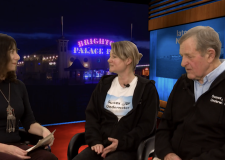Brighton and Hove MPs split over Syria
The three MPs for Brighton and Hove were split over whether to support the possibility of military action in response to the use of chemical weapons in Syria.
The Conservative MPs Mike Weatherley and Simon Kirby, who represent Hove and Brighton Kemptown respectively, voted with the coalition government – as did Norman Baker, the Liberal Democrat MP for Lewes.
But Caroline Lucas, the Green MP for Brighton Pavilion, voted against the potential involvement of British troops in any military response after a debate in the House of Commons.
Tim Loughton, the Conservative MP for East Worthing and Shoreham, voted both for and against the government, in effect abstaining. He has set out his opposition to military intervention on his website.
David Cameron was forced to rethink his plans on the road to Damascus as the government was defeated at the end of the debate after the emergency recall of Parliament.
Dr Lucas was the first MP to intervene in the debate. She spoke within minutes of the Prime Minister David Cameron rising to his feet to make the case for action against the regime of Bashar Assad.
She said: “Will (the Prime Minister) tell the House why he has refused to publish the Attorney-General’s full advice?
“Why has he instead published just a one-and-a-half-side summary of it, especially when so many legal experts are saying that without explicit UN Security Council reinforcement, military action simply would not be legal under international law?”
Mr Cameron said: “There had been a long-standing convention, backed by attorney-generals of all parties and all governments, not to publish any legal advice at all.
“This government changed that. With the Libya conflict, we published a summary of the legal advice.
“On this issue, we have published a very clear summary of the legal advice and I urge all right honourable and honourable members to read it.”
Dr Lucas made a fuller contribution to the debate later on. Over the course of seven minutes she said: “Later this evening, the House (of Commons) will divide over whether in principle this country should undertake military action in Syria.
“We will perhaps do justice to the suffering of the Syrian people if we first determine where, as a Parliament, we are at one.
“I have no doubt that we are all united in complete condemnation of the deplorable chemical attacks on civilians in Damascus.
“The gut-wrenching images of those attacks are etched on all our minds as we sit here tonight.
“All of us seek an outcome that will bring peace and stability to the region. That much we can agree.
“It is also the case that this motion is less damaging than the one we were originally led to believe we would be debating.
“That is a tribute to the fact that backbench and opposition MPs can make a difference.
“To that extent, this is a good day for Parliament and for public pressure.
“It is clear to me that those things have helped to force the government to think twice about their way forward on Syria.
“I welcome the fact that this motion recognises that to have proceeded with a military attack as the UN weapons inspectors were still visiting the sites of the alleged chemical weapons assault would have been preposterous.
“It beggared belief that, once again, we could have been about to embark on military engagement without apparently having learnt any of the lessons from Iraq and Afghanistan.
“By seeking to pre-empt the outcome of the inspectors’ work, we would also have increased the likelihood that further requests for access by weapons inspectors would be denied.
“They would be regarded simply as a ploy for subsequent military action, regardless of the findings.
“As Hans Blix pointed out earlier this week: ‘If the aim is to stop the breach of international law and to keep the lid on others with chemical weapons, military action without first waiting for the UN inspectors’ report is not the way to go about it.’
“Although I am pleased that the government’s motion now accepts that we must wait for the inspectors’ reports, I am deeply concerned at their cavalier treatment of international law and I completely reject their drive towards military action.
“On the legal question, both the US and our government are indicating that they are prepared to act against Syria without a UN mandate.
“For all that the government’s motion talks of making ‘every effort’ to ensure a Security Council resolution, the bottom line appears to be that they are happy to proceed without one.
“We are told that intervention could be legally justified without a Security Council resolution under the UN’s responsibility to protect.
“But the 2005 UN world summit outcome document, in which the heads of state unanimously approved the new international norm of the responsibility to protect, subsequently approved by UN Security Council resolution 1674, states clearly that it is still subject to UN Security Council agreement.
“Former US Secretary of State Madeleine Albright, who co-chaired a working group on the responsibility to protect, again stressed that it is to be implemented in accordance with the UN charter.
“That means that the central decision-making authority is the UN Security Council.
“The conclusion from all this is clearly, if inconveniently for the government, that military action against a sovereign state, other than in self-defence, without the authority of the Security Council cannot be justified under the responsibility to protect.
“On that issue the Labour amendment is also, unfortunately, very weak. It regards international law as an inconvenience.
“That makes it all the more important that our deliberations today are informed by all the relevant information and based on sound legal grounding.”
Jeremy Corbyn, the Labour MP for Islington North, asked Dr Lucas: “Does the honourable lady agree that the government’s position would be far stronger if, instead of coming here proposing military action, they had come here to tell us that they were having serious discussions with the new government in Iran and a new round of talks with Russia, and that they were trying to build a consensus in the region to bring about what must happen at some point—a political solution to this crisis?”
Dr Lucas said: “I could not agree more with the honourable gentleman. As he rightly highlights, we have an opportunity now with the new regime in Iran and we should be responding to a more moderate leader there, yet by going ahead and giving a signal that military action is the direction in which we are heading, we absolutely undermine the authority of that new leader in Iran.
“I was making the case that we should have seen the Attorney-General’s full legal opinion and that this one-and-a-half-side summary is simply unacceptable.
“While I am on the subject of further pieces of information that could have usefully informed this debate, I wish to refer honourable members again to the Chilcot report – that missing report which has gone absent without leave.
“It is unacceptable that, yet again, many people are talking about the importance of the legacy of Iraq and we do not have that document, which would have given us the lessons to be learnt.”
Another MP intervened, Martin Horwood, the Liberal Democrat who represents Cheltenham. He said: “The honourable lady seems to be making a reasonably powerful case against any use of military force whatsoever.
“Faced with one motion that does not rule it in and a Labour motion that does not rule it out, is not the logic for all those who have spoken against military action today, including those on the Labour benches, to vote against them both?”
Dr Lucas said: “The honourable gentleman’s point is, unfortunately, a very strong one. He knows what I mean.
“I remain to be convinced that a military attack would deter, rather than escalate, conflict in the region, which is why I agree with what the honourable member for Cheltenham (Martin Horwood) just said.
“I have yet to hear what the strategy would be for Syria and the wider region in the event of an attack.
“I listened carefully to the Deputy Prime Minister (Nick Clegg) on the radio this morning.
“It was put to him that Assad could well retaliate against an attack but when he was asked what we would do in the face of such an escalation, answer came there none.
“I remain concerned as well about the impact of flouting international law.
“To intervene without the due resolution would send a message to everyone else that international law can be ignored when it is inconvenient.
“As the law of the jungle takes hold, it will be increasingly difficult to condemn similar actions by others.
“I am increasingly convinced, therefore, that only a political and diplomatic solution will solve the war raging in Syria and by extension hold its spread beyond the region.
“That is why I will not support the government’s motion and why I tabled my own amendment setting out that the case for military action had not been made.
“I am sorry that we will not have an opportunity to put that amendment to the vote, because it would have addressed the issue raised by the honourable member for Cheltenham.
“Had it been accepted, we would have had a genuine choice tonight.
“We need to strain every sinew to get all relevant parties around the table for peace talks.
“On so many levels, as others have said, this is a proxy war, which is why we need China, Russia, Iran, Saudi Arabia and many others involved as well.
“We also absolutely need to redouble our efforts to support refugees.
“We are hearing from many of the development agencies, including Oxfam, that the situation facing those refugees, both in Syria and the wider region, is appalling.
“More than eight million people are now in desperate need of supplies.
“That is why people who say ‘If we don’t have military action, it is equivalent to doing nothing’ are so misguided.
“There is much we can do on refugees and a political solution.”
The debate was concluded by the Deputy Prime Minister Nick Clegg, who said: “I wholeheartedly agree with – I know the Prime Minister does, too, as we all do – recognise, understand and in many ways share people’s anxieties in wrestling with this terrifically difficult dilemma.
“That is the spirit in which this debate has been conducted for close to eight hours and that is the spirit in which I believe we should treat the matter.
“(A) cluster of questions concerned the legality and legitimacy of any measures that might be taken. The honourable members for Croydon South (Richard Ottaway), for Brighton Pavilion (Caroline Lucas) and for Hexham (Guy Opperman) and many others spoke on this issue.
“The Attorney-General has confirmed that the use of chemical weapons in Syria constitutes a war crime and a crime against humanity.
“The government’s legal position, there for everyone to see, is also clear that the principle of humanitarian intervention provides a sound legal basis for the deployment of UK forces and military assets in an operation to deter and disrupt the use of chemical weapons, if the House, in a separate vote and a separate debate, were ever to decide to deploy.
“Let me be very clear on that point, because many right honourable and honourable members expressed some anxiety about it: the motion in no way sends out an amber light message or is permissive of military action.
“Military action would only ever be undertaken by our country or be permitted or mandated by the House on the back of a separate debate and separate vote.
“In other words, right honourable and honourable members can support the motion today and be entirely free to refuse or withhold their consent to military action, if that was put to the House.”
The government motion and an opposition amendment were both defeated.
Parliament returns on Monday (2 September).






















